Reflection Assignment: Teamwork, Health Promotion, and Nursing
VerifiedAdded on 2023/04/03
|7
|1530
|147
Essay
AI Summary
This reflection assignment delves into a student's experience with a health promotion project, specifically focusing on teamwork dynamics, the application of the Driscoll model, and its impact on professional development within a nursing context. The student, acting as team leader, analyzes the project's successes and failures, highlighting issues like poor communication, lack of team cohesion, and ineffective leadership, ultimately contributing to a presentation that did not fully meet its objectives. The essay identifies shortcomings in the team's approach, such as a failure to establish strong interpersonal relationships and incorporate all team member's suggestions, and then examines how these issues could have been mitigated through the application of the Tuckman model. The reflection also emphasizes the importance of skills such as self-regulation, effective listening, and stress management, particularly in the context of interdisciplinary healthcare teams. It concludes with a commitment to further develop these skills through evidence-based learning and workshops to improve teamwork and leadership capabilities in future professional endeavors.

Running head: REFLECTION ASSIGNMENT
REFLECTION ASSIGNMENT
Name of the student:
Name of the university:
Author note:
REFLECTION ASSIGNMENT
Name of the student:
Name of the university:
Author note:
Paraphrase This Document
Need a fresh take? Get an instant paraphrase of this document with our AI Paraphraser
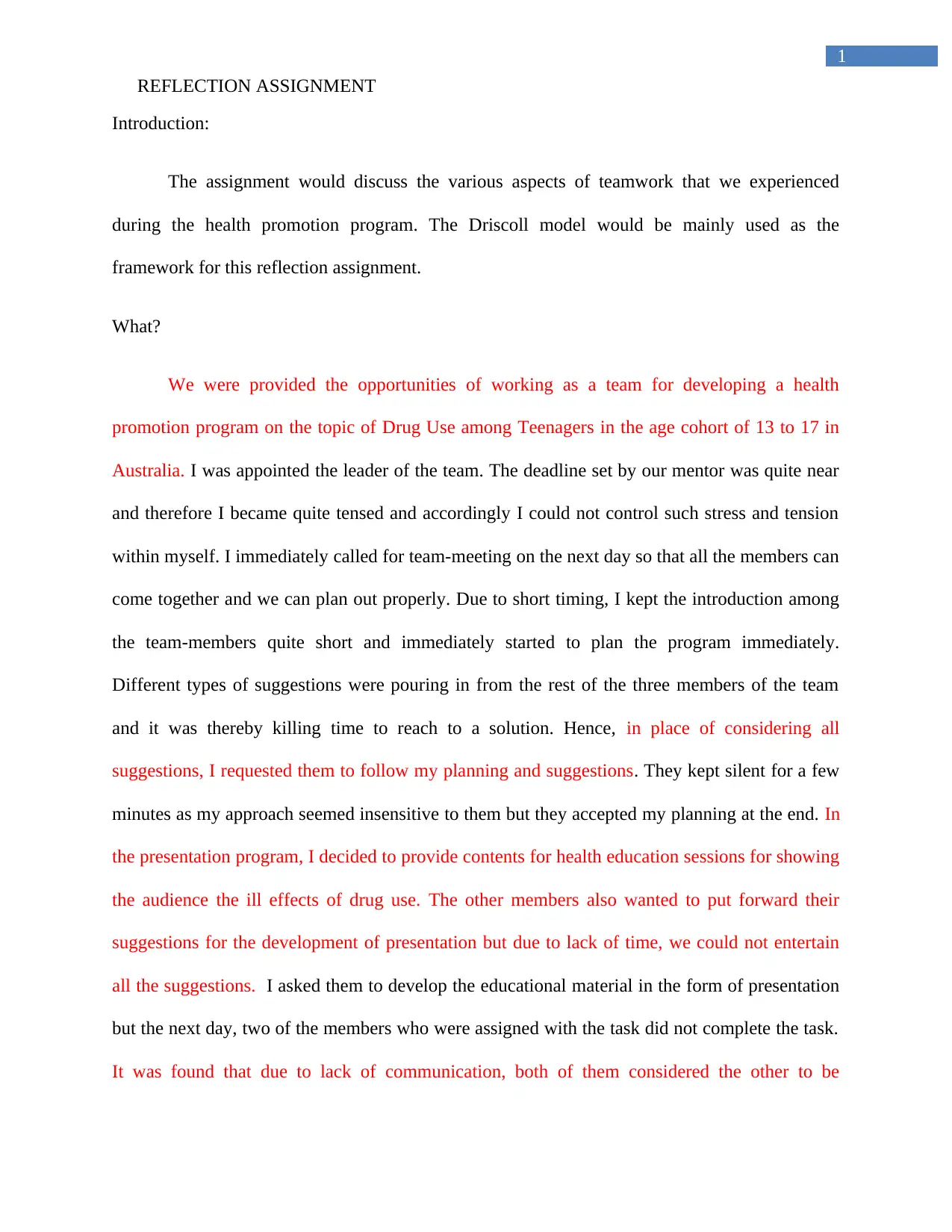
1
REFLECTION ASSIGNMENT
Introduction:
The assignment would discuss the various aspects of teamwork that we experienced
during the health promotion program. The Driscoll model would be mainly used as the
framework for this reflection assignment.
What?
We were provided the opportunities of working as a team for developing a health
promotion program on the topic of Drug Use among Teenagers in the age cohort of 13 to 17 in
Australia. I was appointed the leader of the team. The deadline set by our mentor was quite near
and therefore I became quite tensed and accordingly I could not control such stress and tension
within myself. I immediately called for team-meeting on the next day so that all the members can
come together and we can plan out properly. Due to short timing, I kept the introduction among
the team-members quite short and immediately started to plan the program immediately.
Different types of suggestions were pouring in from the rest of the three members of the team
and it was thereby killing time to reach to a solution. Hence, in place of considering all
suggestions, I requested them to follow my planning and suggestions. They kept silent for a few
minutes as my approach seemed insensitive to them but they accepted my planning at the end. In
the presentation program, I decided to provide contents for health education sessions for showing
the audience the ill effects of drug use. The other members also wanted to put forward their
suggestions for the development of presentation but due to lack of time, we could not entertain
all the suggestions. I asked them to develop the educational material in the form of presentation
but the next day, two of the members who were assigned with the task did not complete the task.
It was found that due to lack of communication, both of them considered the other to be
REFLECTION ASSIGNMENT
Introduction:
The assignment would discuss the various aspects of teamwork that we experienced
during the health promotion program. The Driscoll model would be mainly used as the
framework for this reflection assignment.
What?
We were provided the opportunities of working as a team for developing a health
promotion program on the topic of Drug Use among Teenagers in the age cohort of 13 to 17 in
Australia. I was appointed the leader of the team. The deadline set by our mentor was quite near
and therefore I became quite tensed and accordingly I could not control such stress and tension
within myself. I immediately called for team-meeting on the next day so that all the members can
come together and we can plan out properly. Due to short timing, I kept the introduction among
the team-members quite short and immediately started to plan the program immediately.
Different types of suggestions were pouring in from the rest of the three members of the team
and it was thereby killing time to reach to a solution. Hence, in place of considering all
suggestions, I requested them to follow my planning and suggestions. They kept silent for a few
minutes as my approach seemed insensitive to them but they accepted my planning at the end. In
the presentation program, I decided to provide contents for health education sessions for showing
the audience the ill effects of drug use. The other members also wanted to put forward their
suggestions for the development of presentation but due to lack of time, we could not entertain
all the suggestions. I asked them to develop the educational material in the form of presentation
but the next day, two of the members who were assigned with the task did not complete the task.
It was found that due to lack of communication, both of them considered the other to be
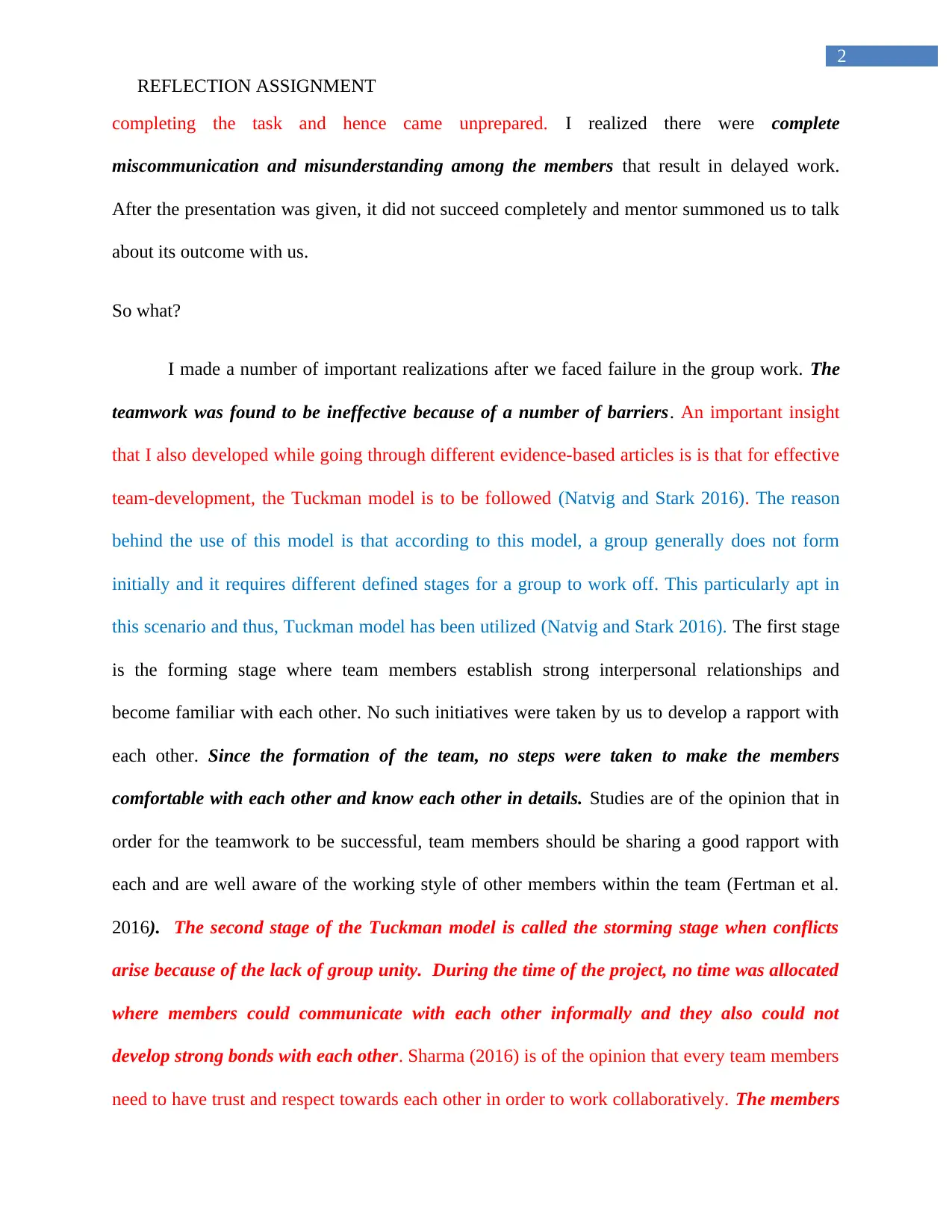
2
REFLECTION ASSIGNMENT
completing the task and hence came unprepared. I realized there were complete
miscommunication and misunderstanding among the members that result in delayed work.
After the presentation was given, it did not succeed completely and mentor summoned us to talk
about its outcome with us.
So what?
I made a number of important realizations after we faced failure in the group work. The
teamwork was found to be ineffective because of a number of barriers. An important insight
that I also developed while going through different evidence-based articles is is that for effective
team-development, the Tuckman model is to be followed (Natvig and Stark 2016). The reason
behind the use of this model is that according to this model, a group generally does not form
initially and it requires different defined stages for a group to work off. This particularly apt in
this scenario and thus, Tuckman model has been utilized (Natvig and Stark 2016). The first stage
is the forming stage where team members establish strong interpersonal relationships and
become familiar with each other. No such initiatives were taken by us to develop a rapport with
each other. Since the formation of the team, no steps were taken to make the members
comfortable with each other and know each other in details. Studies are of the opinion that in
order for the teamwork to be successful, team members should be sharing a good rapport with
each and are well aware of the working style of other members within the team (Fertman et al.
2016). The second stage of the Tuckman model is called the storming stage when conflicts
arise because of the lack of group unity. During the time of the project, no time was allocated
where members could communicate with each other informally and they also could not
develop strong bonds with each other. Sharma (2016) is of the opinion that every team members
need to have trust and respect towards each other in order to work collaboratively. The members
REFLECTION ASSIGNMENT
completing the task and hence came unprepared. I realized there were complete
miscommunication and misunderstanding among the members that result in delayed work.
After the presentation was given, it did not succeed completely and mentor summoned us to talk
about its outcome with us.
So what?
I made a number of important realizations after we faced failure in the group work. The
teamwork was found to be ineffective because of a number of barriers. An important insight
that I also developed while going through different evidence-based articles is is that for effective
team-development, the Tuckman model is to be followed (Natvig and Stark 2016). The reason
behind the use of this model is that according to this model, a group generally does not form
initially and it requires different defined stages for a group to work off. This particularly apt in
this scenario and thus, Tuckman model has been utilized (Natvig and Stark 2016). The first stage
is the forming stage where team members establish strong interpersonal relationships and
become familiar with each other. No such initiatives were taken by us to develop a rapport with
each other. Since the formation of the team, no steps were taken to make the members
comfortable with each other and know each other in details. Studies are of the opinion that in
order for the teamwork to be successful, team members should be sharing a good rapport with
each and are well aware of the working style of other members within the team (Fertman et al.
2016). The second stage of the Tuckman model is called the storming stage when conflicts
arise because of the lack of group unity. During the time of the project, no time was allocated
where members could communicate with each other informally and they also could not
develop strong bonds with each other. Sharma (2016) is of the opinion that every team members
need to have trust and respect towards each other in order to work collaboratively. The members
⊘ This is a preview!⊘
Do you want full access?
Subscribe today to unlock all pages.

Trusted by 1+ million students worldwide
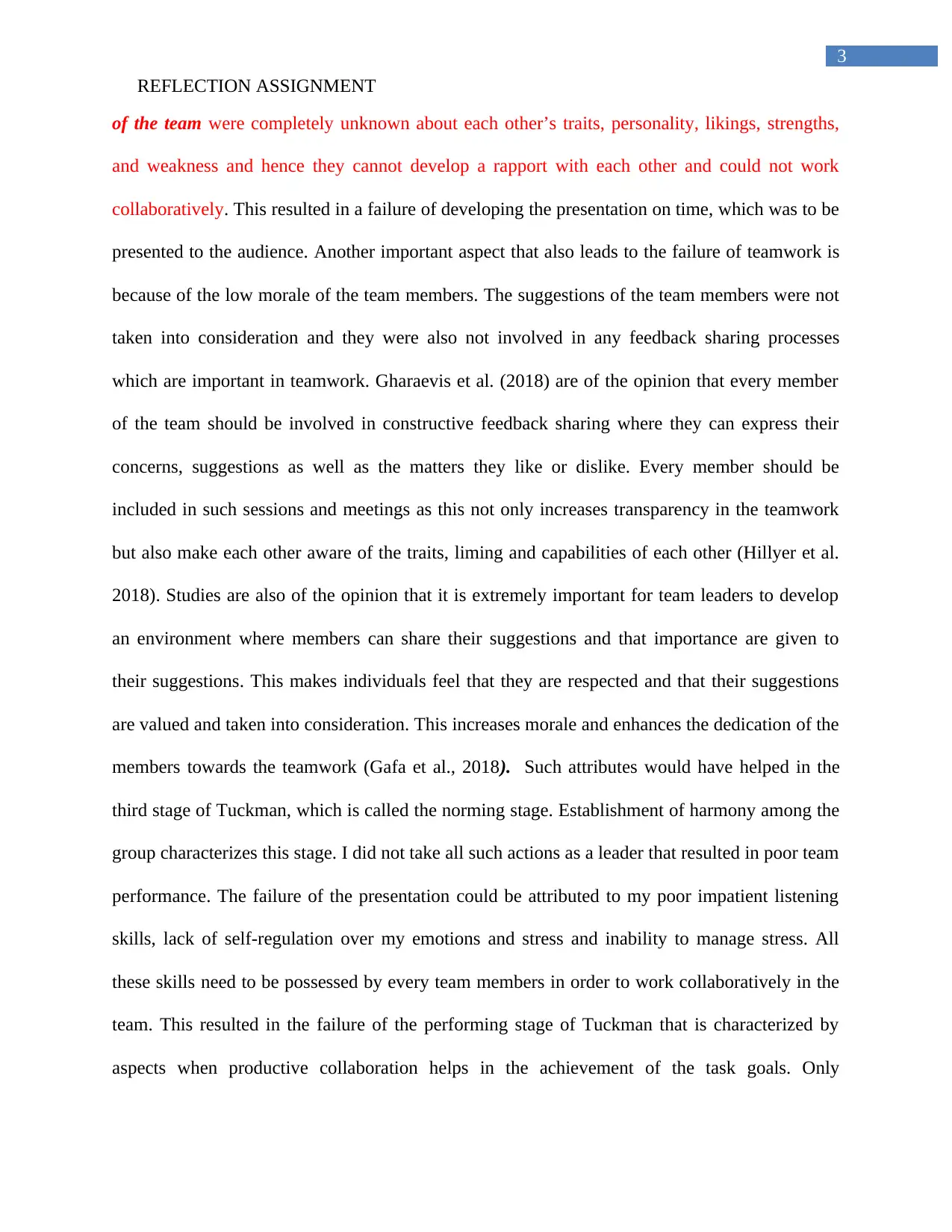
3
REFLECTION ASSIGNMENT
of the team were completely unknown about each other’s traits, personality, likings, strengths,
and weakness and hence they cannot develop a rapport with each other and could not work
collaboratively. This resulted in a failure of developing the presentation on time, which was to be
presented to the audience. Another important aspect that also leads to the failure of teamwork is
because of the low morale of the team members. The suggestions of the team members were not
taken into consideration and they were also not involved in any feedback sharing processes
which are important in teamwork. Gharaevis et al. (2018) are of the opinion that every member
of the team should be involved in constructive feedback sharing where they can express their
concerns, suggestions as well as the matters they like or dislike. Every member should be
included in such sessions and meetings as this not only increases transparency in the teamwork
but also make each other aware of the traits, liming and capabilities of each other (Hillyer et al.
2018). Studies are also of the opinion that it is extremely important for team leaders to develop
an environment where members can share their suggestions and that importance are given to
their suggestions. This makes individuals feel that they are respected and that their suggestions
are valued and taken into consideration. This increases morale and enhances the dedication of the
members towards the teamwork (Gafa et al., 2018). Such attributes would have helped in the
third stage of Tuckman, which is called the norming stage. Establishment of harmony among the
group characterizes this stage. I did not take all such actions as a leader that resulted in poor team
performance. The failure of the presentation could be attributed to my poor impatient listening
skills, lack of self-regulation over my emotions and stress and inability to manage stress. All
these skills need to be possessed by every team members in order to work collaboratively in the
team. This resulted in the failure of the performing stage of Tuckman that is characterized by
aspects when productive collaboration helps in the achievement of the task goals. Only
REFLECTION ASSIGNMENT
of the team were completely unknown about each other’s traits, personality, likings, strengths,
and weakness and hence they cannot develop a rapport with each other and could not work
collaboratively. This resulted in a failure of developing the presentation on time, which was to be
presented to the audience. Another important aspect that also leads to the failure of teamwork is
because of the low morale of the team members. The suggestions of the team members were not
taken into consideration and they were also not involved in any feedback sharing processes
which are important in teamwork. Gharaevis et al. (2018) are of the opinion that every member
of the team should be involved in constructive feedback sharing where they can express their
concerns, suggestions as well as the matters they like or dislike. Every member should be
included in such sessions and meetings as this not only increases transparency in the teamwork
but also make each other aware of the traits, liming and capabilities of each other (Hillyer et al.
2018). Studies are also of the opinion that it is extremely important for team leaders to develop
an environment where members can share their suggestions and that importance are given to
their suggestions. This makes individuals feel that they are respected and that their suggestions
are valued and taken into consideration. This increases morale and enhances the dedication of the
members towards the teamwork (Gafa et al., 2018). Such attributes would have helped in the
third stage of Tuckman, which is called the norming stage. Establishment of harmony among the
group characterizes this stage. I did not take all such actions as a leader that resulted in poor team
performance. The failure of the presentation could be attributed to my poor impatient listening
skills, lack of self-regulation over my emotions and stress and inability to manage stress. All
these skills need to be possessed by every team members in order to work collaboratively in the
team. This resulted in the failure of the performing stage of Tuckman that is characterized by
aspects when productive collaboration helps in the achievement of the task goals. Only
Paraphrase This Document
Need a fresh take? Get an instant paraphrase of this document with our AI Paraphraser
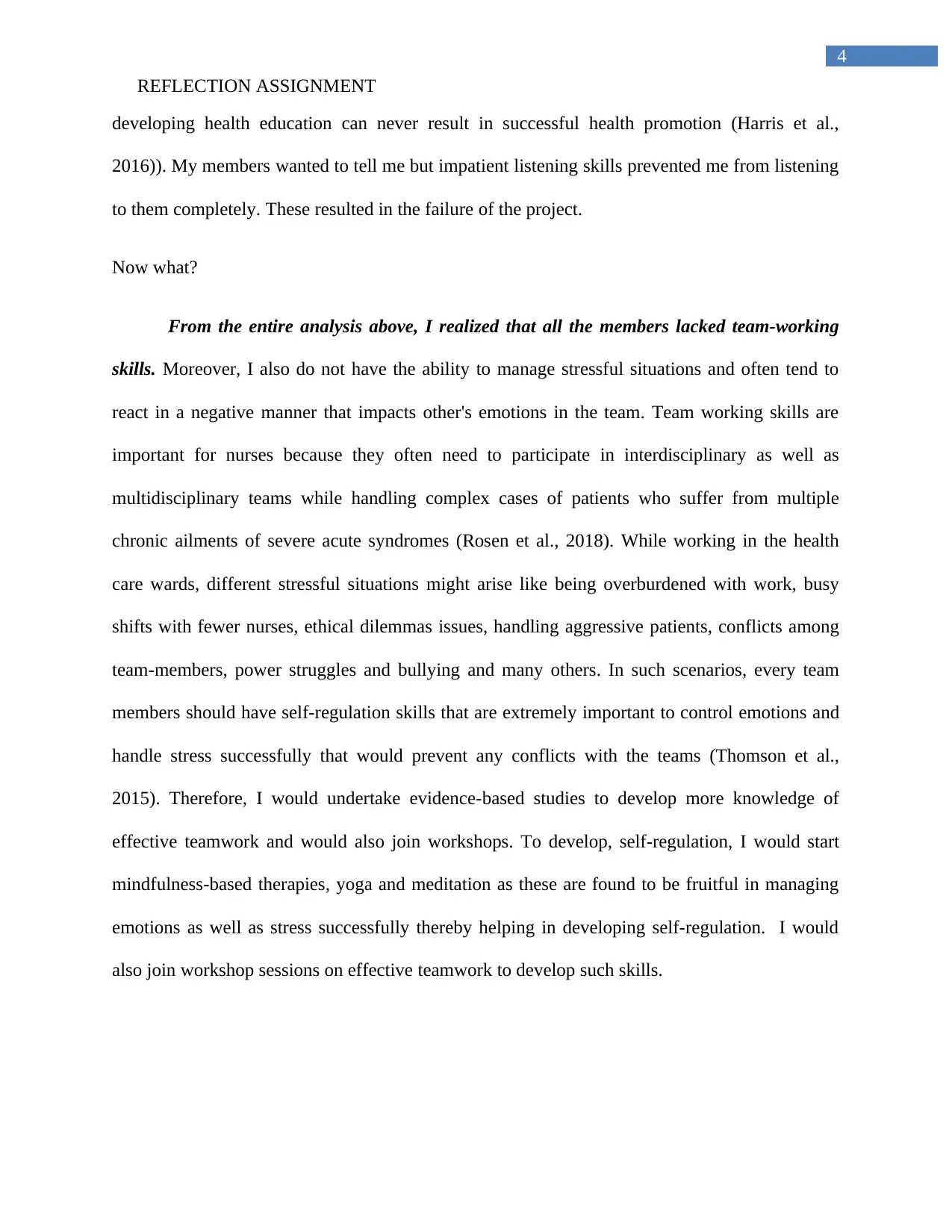
4
REFLECTION ASSIGNMENT
developing health education can never result in successful health promotion (Harris et al.,
2016)). My members wanted to tell me but impatient listening skills prevented me from listening
to them completely. These resulted in the failure of the project.
Now what?
From the entire analysis above, I realized that all the members lacked team-working
skills. Moreover, I also do not have the ability to manage stressful situations and often tend to
react in a negative manner that impacts other's emotions in the team. Team working skills are
important for nurses because they often need to participate in interdisciplinary as well as
multidisciplinary teams while handling complex cases of patients who suffer from multiple
chronic ailments of severe acute syndromes (Rosen et al., 2018). While working in the health
care wards, different stressful situations might arise like being overburdened with work, busy
shifts with fewer nurses, ethical dilemmas issues, handling aggressive patients, conflicts among
team-members, power struggles and bullying and many others. In such scenarios, every team
members should have self-regulation skills that are extremely important to control emotions and
handle stress successfully that would prevent any conflicts with the teams (Thomson et al.,
2015). Therefore, I would undertake evidence-based studies to develop more knowledge of
effective teamwork and would also join workshops. To develop, self-regulation, I would start
mindfulness-based therapies, yoga and meditation as these are found to be fruitful in managing
emotions as well as stress successfully thereby helping in developing self-regulation. I would
also join workshop sessions on effective teamwork to develop such skills.
REFLECTION ASSIGNMENT
developing health education can never result in successful health promotion (Harris et al.,
2016)). My members wanted to tell me but impatient listening skills prevented me from listening
to them completely. These resulted in the failure of the project.
Now what?
From the entire analysis above, I realized that all the members lacked team-working
skills. Moreover, I also do not have the ability to manage stressful situations and often tend to
react in a negative manner that impacts other's emotions in the team. Team working skills are
important for nurses because they often need to participate in interdisciplinary as well as
multidisciplinary teams while handling complex cases of patients who suffer from multiple
chronic ailments of severe acute syndromes (Rosen et al., 2018). While working in the health
care wards, different stressful situations might arise like being overburdened with work, busy
shifts with fewer nurses, ethical dilemmas issues, handling aggressive patients, conflicts among
team-members, power struggles and bullying and many others. In such scenarios, every team
members should have self-regulation skills that are extremely important to control emotions and
handle stress successfully that would prevent any conflicts with the teams (Thomson et al.,
2015). Therefore, I would undertake evidence-based studies to develop more knowledge of
effective teamwork and would also join workshops. To develop, self-regulation, I would start
mindfulness-based therapies, yoga and meditation as these are found to be fruitful in managing
emotions as well as stress successfully thereby helping in developing self-regulation. I would
also join workshop sessions on effective teamwork to develop such skills.
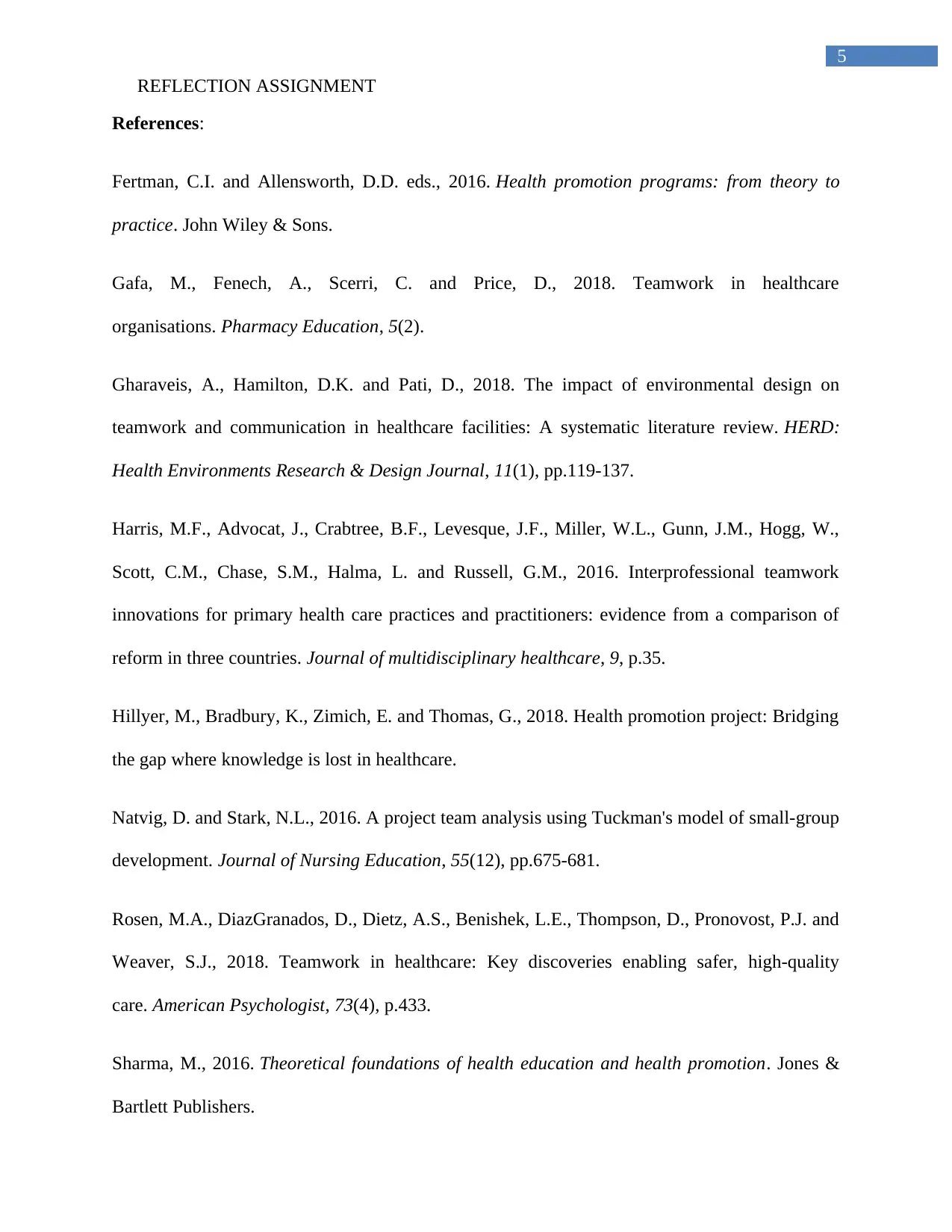
5
REFLECTION ASSIGNMENT
References:
Fertman, C.I. and Allensworth, D.D. eds., 2016. Health promotion programs: from theory to
practice. John Wiley & Sons.
Gafa, M., Fenech, A., Scerri, C. and Price, D., 2018. Teamwork in healthcare
organisations. Pharmacy Education, 5(2).
Gharaveis, A., Hamilton, D.K. and Pati, D., 2018. The impact of environmental design on
teamwork and communication in healthcare facilities: A systematic literature review. HERD:
Health Environments Research & Design Journal, 11(1), pp.119-137.
Harris, M.F., Advocat, J., Crabtree, B.F., Levesque, J.F., Miller, W.L., Gunn, J.M., Hogg, W.,
Scott, C.M., Chase, S.M., Halma, L. and Russell, G.M., 2016. Interprofessional teamwork
innovations for primary health care practices and practitioners: evidence from a comparison of
reform in three countries. Journal of multidisciplinary healthcare, 9, p.35.
Hillyer, M., Bradbury, K., Zimich, E. and Thomas, G., 2018. Health promotion project: Bridging
the gap where knowledge is lost in healthcare.
Natvig, D. and Stark, N.L., 2016. A project team analysis using Tuckman's model of small-group
development. Journal of Nursing Education, 55(12), pp.675-681.
Rosen, M.A., DiazGranados, D., Dietz, A.S., Benishek, L.E., Thompson, D., Pronovost, P.J. and
Weaver, S.J., 2018. Teamwork in healthcare: Key discoveries enabling safer, high-quality
care. American Psychologist, 73(4), p.433.
Sharma, M., 2016. Theoretical foundations of health education and health promotion. Jones &
Bartlett Publishers.
REFLECTION ASSIGNMENT
References:
Fertman, C.I. and Allensworth, D.D. eds., 2016. Health promotion programs: from theory to
practice. John Wiley & Sons.
Gafa, M., Fenech, A., Scerri, C. and Price, D., 2018. Teamwork in healthcare
organisations. Pharmacy Education, 5(2).
Gharaveis, A., Hamilton, D.K. and Pati, D., 2018. The impact of environmental design on
teamwork and communication in healthcare facilities: A systematic literature review. HERD:
Health Environments Research & Design Journal, 11(1), pp.119-137.
Harris, M.F., Advocat, J., Crabtree, B.F., Levesque, J.F., Miller, W.L., Gunn, J.M., Hogg, W.,
Scott, C.M., Chase, S.M., Halma, L. and Russell, G.M., 2016. Interprofessional teamwork
innovations for primary health care practices and practitioners: evidence from a comparison of
reform in three countries. Journal of multidisciplinary healthcare, 9, p.35.
Hillyer, M., Bradbury, K., Zimich, E. and Thomas, G., 2018. Health promotion project: Bridging
the gap where knowledge is lost in healthcare.
Natvig, D. and Stark, N.L., 2016. A project team analysis using Tuckman's model of small-group
development. Journal of Nursing Education, 55(12), pp.675-681.
Rosen, M.A., DiazGranados, D., Dietz, A.S., Benishek, L.E., Thompson, D., Pronovost, P.J. and
Weaver, S.J., 2018. Teamwork in healthcare: Key discoveries enabling safer, high-quality
care. American Psychologist, 73(4), p.433.
Sharma, M., 2016. Theoretical foundations of health education and health promotion. Jones &
Bartlett Publishers.
⊘ This is a preview!⊘
Do you want full access?
Subscribe today to unlock all pages.

Trusted by 1+ million students worldwide
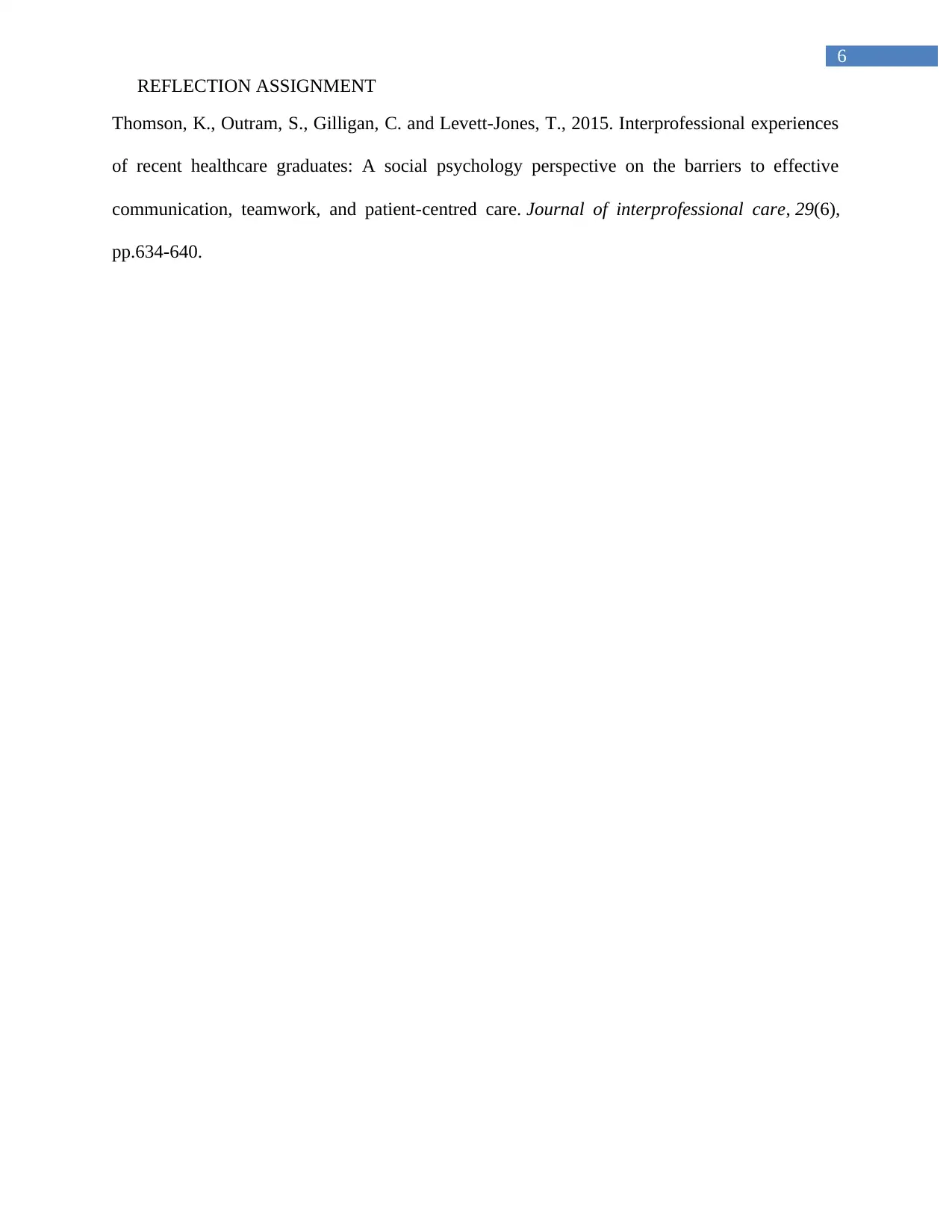
6
REFLECTION ASSIGNMENT
Thomson, K., Outram, S., Gilligan, C. and Levett-Jones, T., 2015. Interprofessional experiences
of recent healthcare graduates: A social psychology perspective on the barriers to effective
communication, teamwork, and patient-centred care. Journal of interprofessional care, 29(6),
pp.634-640.
REFLECTION ASSIGNMENT
Thomson, K., Outram, S., Gilligan, C. and Levett-Jones, T., 2015. Interprofessional experiences
of recent healthcare graduates: A social psychology perspective on the barriers to effective
communication, teamwork, and patient-centred care. Journal of interprofessional care, 29(6),
pp.634-640.
1 out of 7
Related Documents
Your All-in-One AI-Powered Toolkit for Academic Success.
+13062052269
info@desklib.com
Available 24*7 on WhatsApp / Email
![[object Object]](/_next/static/media/star-bottom.7253800d.svg)
Unlock your academic potential
Copyright © 2020–2026 A2Z Services. All Rights Reserved. Developed and managed by ZUCOL.





